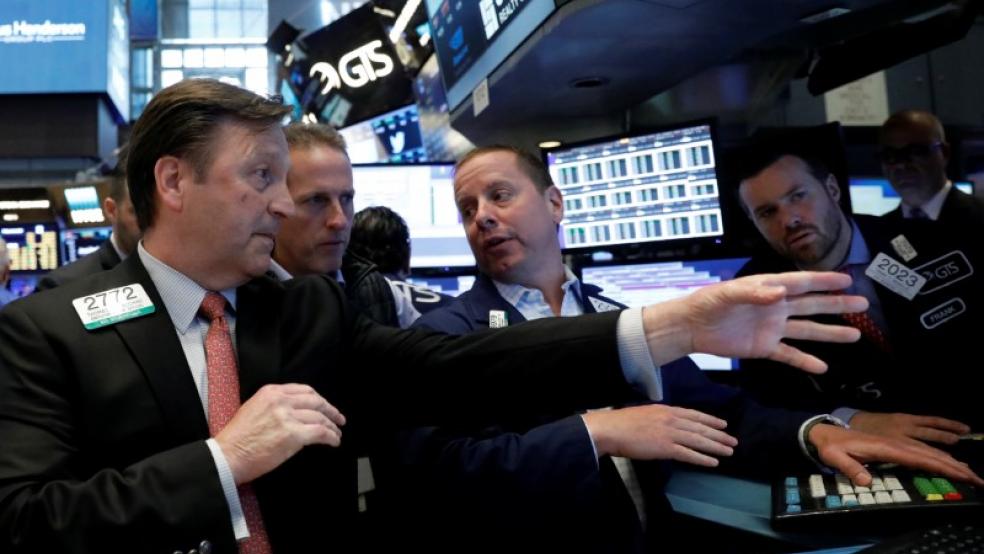LONDON (Reuters) - Global investors trimmed equity holdings by 1.2 percentage points in January, concerned that markets have grown complacent after a thundering bull run and seeing risks of an inflation wake-up call.
Reuters' monthly asset allocation poll of 50 wealth managers and chief investment officers in Europe, the United States, Britain and Japan showed growing caution about equities even as world stock markets <.miwd00000pus> surged to fresh highs in January after repeatedly smashing records in 2017.
The poll was conducted between Jan. 15-29, with most participants responding before a late-month wobble in stocks, but asset managers still cut their equity allocation to 50.1 percent from 51.3 percent in December.
"The main risk today is complacency, without a pullback in major equity markets for nearly two years," said John Husselbee, head of multi-asset at Liontrust.
"Investors are casting off prudence," agreed Mouhammed Choukeir, chief investment officer at Kleinwort Hambros. "In investing, curiosity doesn't kill the cat, complacency does."
Stock markets have rallied hard over the last 12 months, helped by a pick-up in the global economy and corporate profits. But MSCI's world equity index suffered its biggest two-day sell-off in 16 months at the end of January.
Mark Robinson, chief investment officer at Bordier & Cie (UK), said that while markets might continue to grind upwards in 2018, there was a possibility that current economic conditions were as good as it gets.
"There is therefore a real danger that markets forget that much of this optimism has already been priced in."
INFLATION SURPRISE
One concern is that strong growth will fuel inflation, forcing central banks to tighten more aggressively.
"A rise in inflation significantly higher than expected could trigger a sell-off in both equities and bonds, as it would be seen as a sign of the Fed being behind the curve, and thus forced to act quicker than expected," said Cedric Baron, head of multi-asset at Generali Investments.
The U.S. Federal Reserve's gauge of inflation remains stubbornly below its 2 percent target, but U.S. 10-year Treasury yields
spiked to near four-year highs in January as a bond sell-off gathered steam. In the poll, investors raised overall bond allocations slightly to 37 percent of their global balanced portfolios, but cut government bond holdings by almost 2 percentage points to 56.3 percent of their fixed income portfolios. The fear is the tide has turned for bonds as ultra-loose monetary policy in the United States and Europe is coming to an end. Billionaire bond veteran Bill Gross of Janus Henderson has already called a bear market in U.S. Treasuries.But poll participants who answered a question on whether a bear market had begun in government bonds were evenly split."A bear market in bonds calls for more than a global cyclical upswing, as not all forces that dragged yields down over the past decades have suddenly vanished," argued Peter van der Welle, a strategist at Robeco.But Thomas Hempell, deputy head of research at Generali Investments, said the times of "juicy returns" were over. "The bearish correction however will not be as severe as in the early 1990s," he said. "But due to the low coupons prevailing, even a gradual rise in yields will result in negative returns on a wide range of government bonds over the coming quarters."EYEING EUROPE Within global equity portfolios, investors raised their European exposure by 1.8 percentage points to 19.6 percent and trimmed U.S. holdings to 40.1 percent. The euro zone economy expanded at its fastest rate in a decade in 2017 and European equities <.stoxx50e> are set to end January with gains of around 3 percent. "Earnings upside is greatest in emerging markets, Europe and mid-cap Japan," said Larry Hatheway, group head of investment solutions at GAM. "That, combined with better relative valuations, should drive out-performance." But poll participants were almost evenly split over whether risks from Italy's March 4 election had receded.The eurosceptic 5-Star Movement is Italy's most popular single party, but it lags behind a centre-right alliance led by ex-prime minister Silvio Berlusconi's Forza Italia."Our idea is that this risk will be manageable. We do not exclude some volatility that could represent some buying opportunities," said Nadege Dufosse, head of asset allocation at Candriam. (Reporting by Claire Milhench with additional reporting by Maria Pia Quaglia and Hari Kishan; editing by Mark Heinrich)



